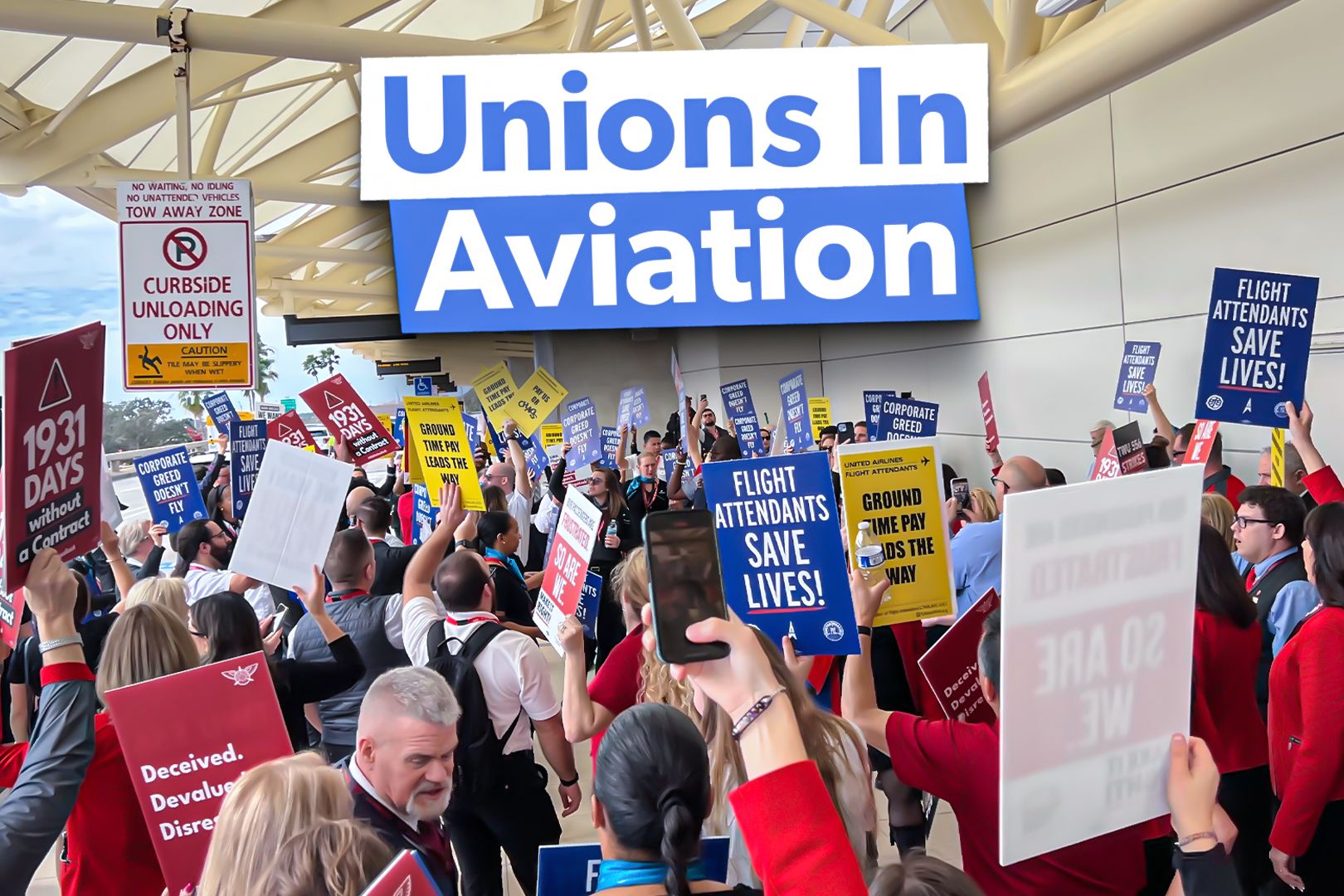
Only a few days ago, Simple Flying covered the news of a former flight attendant from Delta Air Lines who was allegedly fired for supporting unionization . Earlier this month, the negotiations between Boeing and its mechanics in Washington, California, and Oregon (who are represented by the International Association of Machinists and Aerospace Workers (IAM) union) broke down . Only a few days later, npr.
org reported that the aerospace giant was looking to layoff 17,000 of its workers as " it continues to lose money and tries to deal with a strike that is crippling production of the company’s best-selling airline planes. " The union has also had a discussion with American's management regarding this. In light of such news, one might wonder about the roles that unions play in modern aviation.
After all, compared to 1977, when 21.7% of private sector workers in the US were union members, the numbers fell to 7.4% in 2006.
In manufacturing, merely 11.7% of private workers were unionized. This is three times lower than the numbers in 1977.
Despite these numbers, which make people wonder if the time for unions is up, unions play a seminal role in the aviation industry. Let's look at why this is the case. Aviation and unionism: a few numbers Let's take a look at the numbers that reflect how big a role unions have played (and continue to play) in the US's airline industry.
These numbers (for 2006) come from the international air transport association (IATA). Nearly half of the workers in the US airline industry are union members. 51.
6% of US workers were covered by collective bargaining agreements. All major airlines in the US, barring Delta Air Lines, are highly unionized. Unions are extremely important in the aviation industry.
After 9/11, a lot of people in the aviation industry were severely affected . Airlines based in the US suffered losses of $8.0 billion in 2001, and the industry bounced back only in 2004.
During this time, plenty of workers in the US aviation industry were laid off with no protection. Something similar happened after the Gulf War. A similar fate beckoned during the pandemic, but the efforts of labor unions throughout the US secured what Forbes dubbed to be a " historic pay protection for aviation workers " as the US Congress prepared to approve " a $2 trillion stimulus bill ": "The bill provides $31 billion in direct grants to pay as many as 750,000 airline industry workers, many but not all union members, through Sept.
30. Of the total, $25 billion is allocated for passenger airlines, $4 billion for cargo airlines, and $3 billion for contractors, including those who employ caterers and airport workers..
.. Additionally, the bill provides $25 billion in loans or grants to the airline industry.
" During the course of this historic occasion, Joseph Tiberi, the then chief of staff for the transportation department of the International Association of Machinists, opined that without the efforts of the labor unions, the decree wouldn't have been possible. Back then, 80-85% of workers for American Airlines , Southwest Airlines , and United Airlines were unionized. Benefits of unions for people working in the airline industry Whether it be the Association of Flight Attendants-CWA , which secures the rights of flight attendants or the Air Line Pilots Association (ALPA), a union representing pilots, or other unions representing other staff in airlines, they work, at large, to protect the rights of the workers.
The benefits of such unions include: A (greater) collective bargaining power : Through unions, members can have greater bargaining and secure better wages, benefits, and working conditions. The president of the Association of Professional Flight Attendants (APFA), Julie Hedrick, even told View From the Wing that there are lots of times on days when flight attendants are not paid. A union, with its collective bargaining power, might be able to address these problems better.
Advocacy for safety : Unions can also improve the safety culture in the aviation industry. Aero Cadet reported that pilot unions are seminal in the " development and implementation of safety protocols, leading to a safer environment for aviators and passengers alike. " Professional Development and Training : Airline unions are known to offer professional development and training to the workers in the union.
This helps workers learn new skills, ensuring that they are in touch with the latest technology in the industry. Boeing filed a complaint with the National Labor Relations Board (NLRB) against the two IAM lodges. Unions are also known to resolve any issue that exists between the industry and the workers.
According to the Center for Aviation (CAPA) , there should be a balance between the demands of the labor union and what the industry seeks: "Enlightened unions will work with aviation management to evolve working conditions and achieve greater efficiency for the sake of the industry's financial health and the consequent preservation and growth of employment. Similarly, enlightened management will work with labor representatives to ensure that the workforce is a partner in implementing change." A few positive impacts of unions, as noted by the unions A few select airline unions have a ring of positivity about the work they have done.
Embry-Riddle Aeronautical University's Journal of Aviation/ Aerospace Education and Research highlights select unions' positive aspects that we haven't already touched upon. Union Positive aspects International Association of Machinists (IAM) A democratic union where representatives come up through the ranks Air Line Pilots Association ( ALPA ) " War chest of millions of dollars to fight abusive management " Setting flight/duty time rules Association of Flight Attendants (AFA) Employee Assistance Program (EAP) Providing support to union members after accidents Advice related to issues surrounding retirement Independent Federation of Flight Attendants (IFFA) Satisfaction while being a part of a movement like IFFA.










